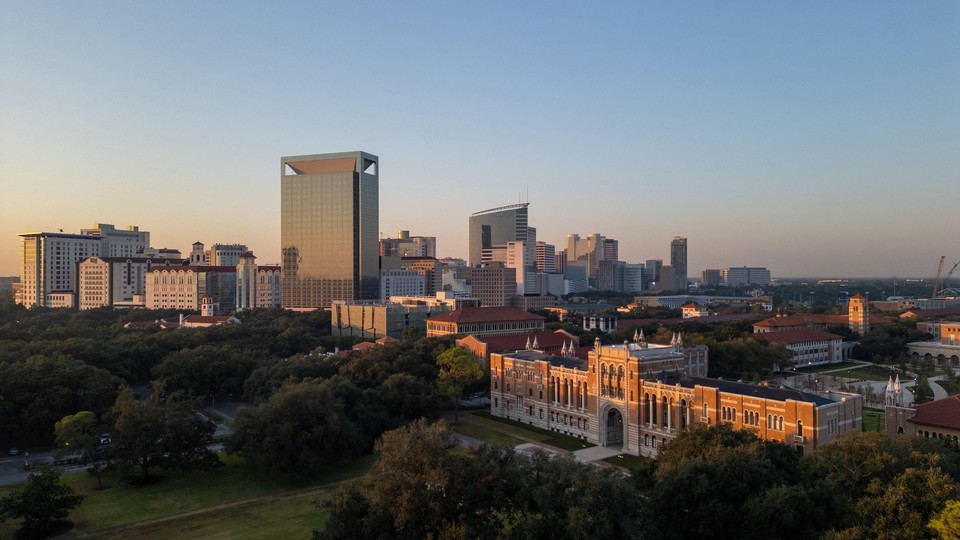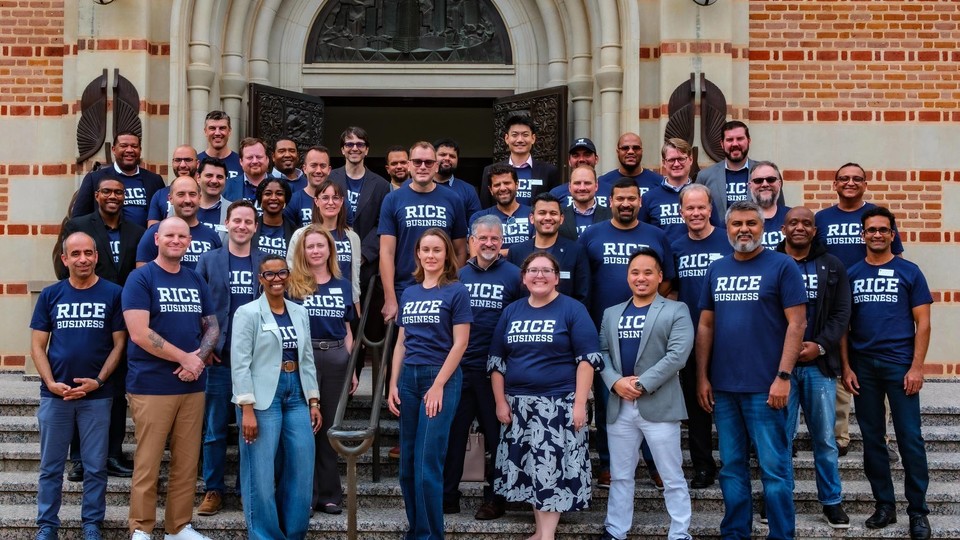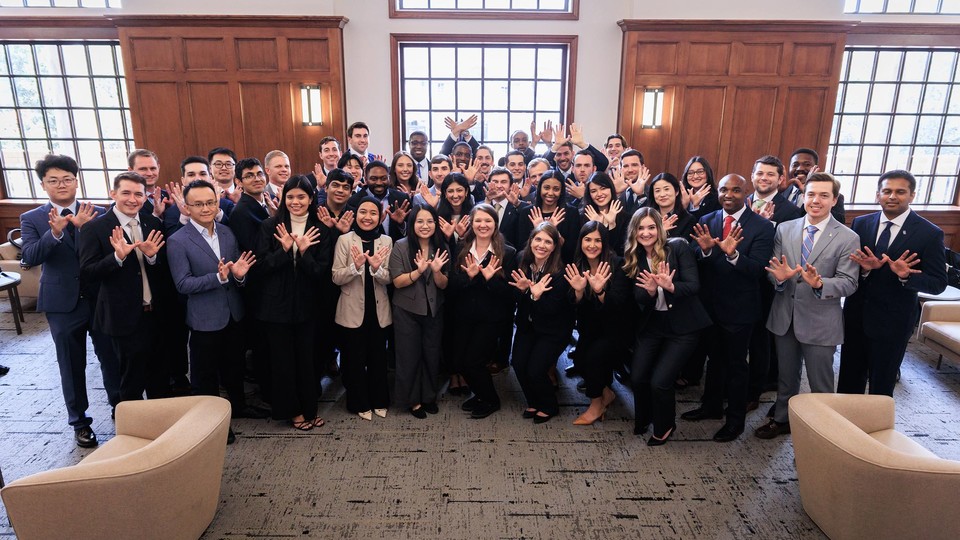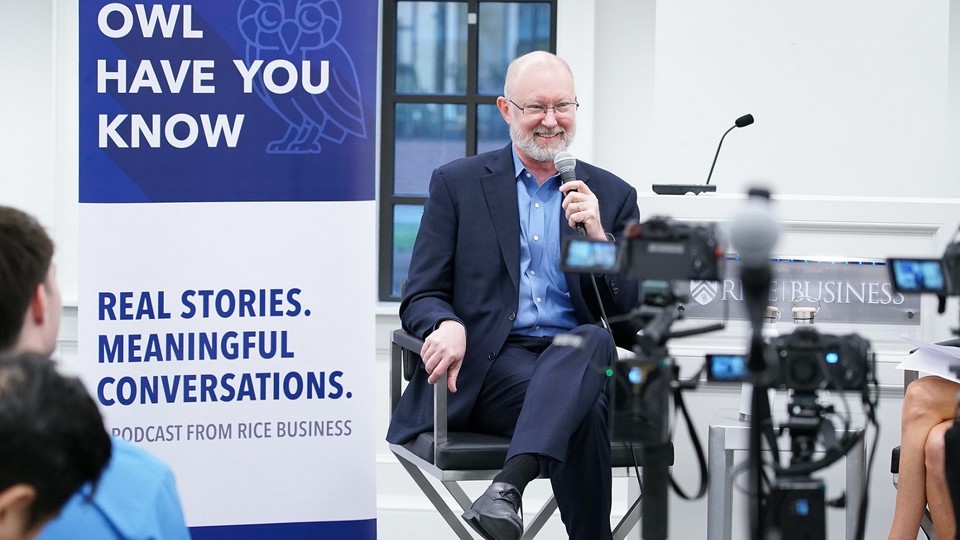Best Colleges for Business 2023
American universities include the best destinations for students wishing to major in business studies because America's higher education system is the most robust, complete, and optimal.

Rice’s Class of 2023 heralded as ‘empathetic team players with superpowers to change the world’
Across two days of joyful tears, stirring speeches, embraces and exultation, Rice University’s 2023 graduates celebrated the end of one chapter in their lives inside the hedges and the thrilling possibilities that lay before them in the chapters beyond.


University’s 110th commencement was first led by President Reginald DesRoches
Across two days of joyful tears, stirring speeches, embraces and exultation, Rice University’s 2023 graduates celebrated the end of one chapter in their lives inside the hedges and the thrilling possibilities that lay before them in the chapters beyond.
This year’s graduation festivities were the first to be led by Rice President Reginald DesRoches, who ascended to the presidency in July 2022, and featured remarks from Karine Jean-Pierre, President Joe Biden’s White House press secretary and a key member of the administrations of both Biden and former President Barack Obama.
This year also saw the conferral of Rice’s first posthumous undergraduate degree to the family of Martel College’s Kamryn Sanamo, who died earlier this year after her yearslong fight against brain cancer.
Commencement fun kicked off May 5 with an evening event to honor Masters of Business Administration graduates from the Jones Graduate School of Business. It was followed May 6 by both the jubilant doctoral commencement ceremony, where Ph.D. graduates celebrated their ascension to the highest level of post-graduate education, and the equally joyful ceremony for recipients of advanced degrees at Tudor Fieldhouse.
The weekend culminated with the undergraduate commencement ceremony at Rice Stadium, capping off graduation celebrations for this academic year following the administration’s January decision to restructure Rice commencement going forward.
Despite the threat of showers, not one of the weekend’s four commencement events spread across Tudor Fieldhouse and historic Rice Stadium had to be altered due to weather. That said, the warm, humid conditions May 5 and 6 were a perfectly Houstonian backdrop for the festivities.
“We wanted to make sure the weather was authentic,” Rice Board of Trustees Chairman Rob Ladd quipped to the crowd Saturday night.
After graduates completed their ceremonial walk through Lovett Hall’s Sallyport and into Rice Stadium, they and their guests were welcomed by Ladd and Dean of Undergraduates Bridget Gorman, before DesRoches took to the podium to extend his congratulations and gratitude to those in attendance.



Try things ‘exceptionally hard and perhaps uncomfortable’
“We welcome you to our campus, and we thank you for lending us these outstanding graduates who have contributed so richly to our community,” DesRoches said to the thousands of parents, relatives, friends and mentors filling the stadium. He remarked on the special connection he felt to the Class of 2023, based on both sharing their early days on campus while he served as dean of the George R. Brown School of Engineering, their shared experience of the height of the COVID-19 pandemic during his time as university provost and due to the presence of one graduating Sid Richardson senior particularly near and dear to his heart.
“How often does a first-year president get to hand out a degree to his baby girl? We are so proud of you, Shelby,” DesRoches said to his daughter.

He asked graduates to thank those loved ones near and far who helped them along their academic journeys before challenging them to continue pushing themselves and to try things “exceptionally hard and perhaps uncomfortable” in the pursuit of intellectual and emotional growth, imploring them to always remember the values of courage and curiosity he first espoused during his presidential inauguration.
“Because of these experiences, you are adaptable, resilient, empathetic team players, with superpowers to change the world,” DesRoches said.
Outgoing Student Association President Gabby Franklin not only congratulated the 2023 graduates on the occasion, but made special note of how much their mentorship and guidance throughout the past several years of fear, uncertainty and upheaval amid the pandemic meant to Rice’s underclassmen.
“You are the last class to experience campus before COVID, the first class to define what the new normal at Rice is, and you’re full of the most accomplished, smart and determined people I have ever known,” Franklin said.
“During your time here, you have not only built up yourselves, but a new future. You succeeded in an academically and socially rigorous environment. You brought your voices to the table in one of the most difficult periods in history, and you’ve brought back the traditions that define Rice in a new era,” she said. “I’m proud to be able to spend one more year in the legacy you made.”

‘Hope is a verb. Hope is action’
DesRoches — the first Black person and immigrant to be Rice’s president — introduced Jean-Pierre, a fellow Haitian immigrant and trailblazer in her field as the first Black woman, the first immigrant woman and the first openly gay woman to hold the post of White House press secretary.
“Although every graduation is an achievement, your path has been steeper and more difficult than most,” Jean-Pierre said. “Your class was just wrapping up your freshman year when COVID emerged and changed our world in an instant. Some of you became ill and had to suspend your studies. Others had to tend to sick family members, or step in and take care of your younger siblings when child care was no longer an option. Some had to deal with the incredible pain of losing friends and family to the deadly pandemic. Classes went virtual, to the word ‘Zoom’ that became part of our shared lexicon. And social activity — a cornerstone of the collegiate experience — was brought to a grinding halt.”

“You’ve seen the worst of us, but you’ve also seen the best of us. You lived through a moment in history where every day was unprecedented, and now you step into a world rife with new challenges and rich in new opportunities,” she said. “I want you to know that today is not only an achievement, but also a testament: a testament to your strength, to your grit and your perseverance.
“You were determined to make it to the finish line. And guess what, Class of 2023? You did.”
She quoted civil rights pioneer Martin Luther King Jr., who told the world “‘we must accept finite disappointment, but never lose infinite hope.’ And through everything we have been thorough, your class, your generation, gives me hope: infinite hope.
“Hope is one of the most powerful tools we have,” she continued. “Hope is more than an emotion, more than a feeling and certainly more than a vibe — I know you guys like to use that word,” she joked to her largely Gen Z audience. “Hope is a discipline and a practice. For me, hope is a verb. Hope is action. Because when we hope for a better world, we create a better world.”
Jean-Pierre referenced the deep font of hope that led her parents to leave their homeland of Haiti for a better life, inspired by that nation’s history as the first country in the Western Hemisphere whose enslaved people “overthrew their colonizers to create the first ever independent country of free people.” They upended their lives to flee the brutal dictatorship of François Duvalier and embarked on a globe-trotting journey that led Jean-Pierre, her parents and her siblings first to Martinique and eventually to the United States in New York City, where her parents worked tirelessly to give their children every opportunity in the world.
She cited Rice’s own reckoning with its history as an institution founded with the wealth William Marsh Rice accrued in no small part due to his enslavement of others as proof positive that meaningful, radical change is possible. “He insisted that this school would only serve the white men and women of Houston,” Jean-Pierre said. “But today, Rice University is open to all, and welcomed its first Black president, DesRoches.”
“The story of Rice University, and my story, stand with the principle that the world is malleable, and we are the ones with the power to transform it,” Jean-Pierre said. “But only if we are willing to take the chance. Hoping for more is not naive — don’t let anybody tell you that. It is brave.”
DesRoches concluded the ceremony by awarding Sanamo’s posthumous degree. “A sports medicine and exercise physiology major and member of Martel College, Kamryn passed away in January with just one semester of study remaining at Rice,” DesRoches said, as Sanamo’s friends and family watched on in the crowd. “She had been tremendously excited to complete her degree, and I’m very pleased that the faculty approved the creation of a posthumous degree policy and that we were able to confer her degree today.”
Degrees were formally conferred upon all those smiling faces lining the field. Tassels were turned and graduation caps were gleefully, triumphantly tossed in the air. The graduates and all those supporting them joined voices to belt out Rice’s alma mater, as a jubilant array of fireworks burst into dazzling color in the sky above.
“Thank you for being here to recognize these graduates and their achievements, and for all you have done along the way to help make this moment possible,” said Gorman. “And to the graduating Class of 2023: they say that every end has a new beginning. So to each of you, best wishes on your new beginning and the road ahead.”
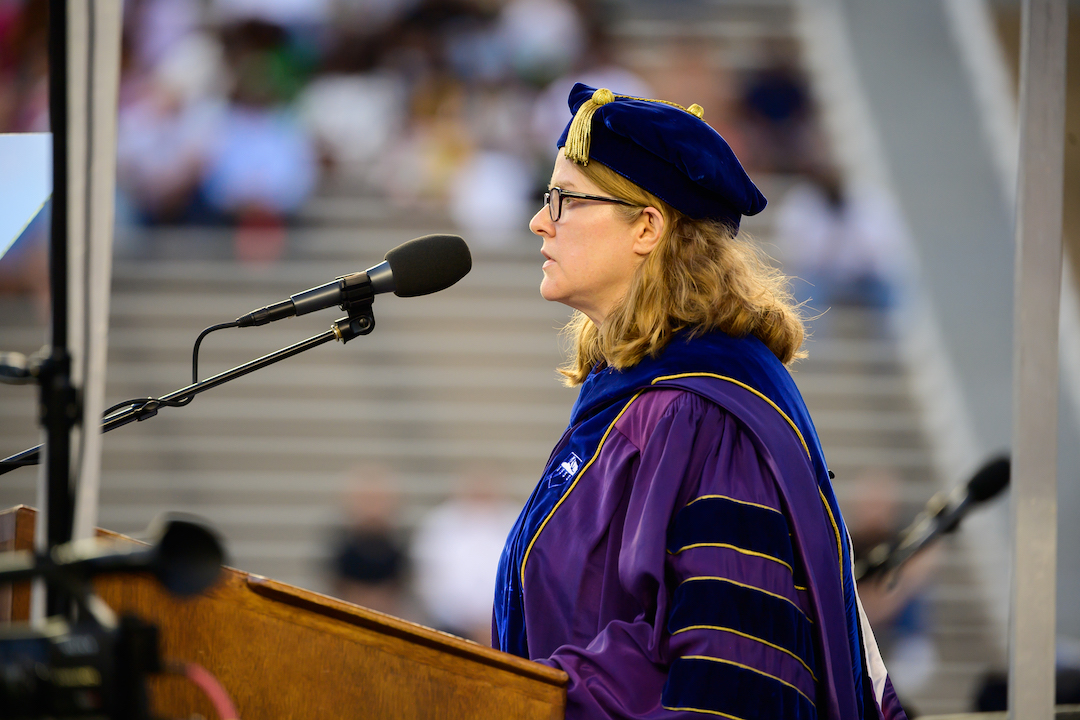



You May Also Like

Rice University’s Jesse H. Jones Graduate School of Business today announced the launch of its Graduate Certificate in Healthcare Management program, a 10-month, credit-bearing professional credential designed for current and aspiring leaders seeking deep expertise in the business of healthcare.
Cal Maritime cadets ready to become ‘giants of industry’
Opportunity. The word was used often during Cal Maritime 2023 Graduation Ceremony. During her commencement address, Ally Cedeno '20 of Women Offshore Foundation used the word when speaking to the school’s 93rd graduating class. “The world needs your leadership and you belong in this industry,” she said.
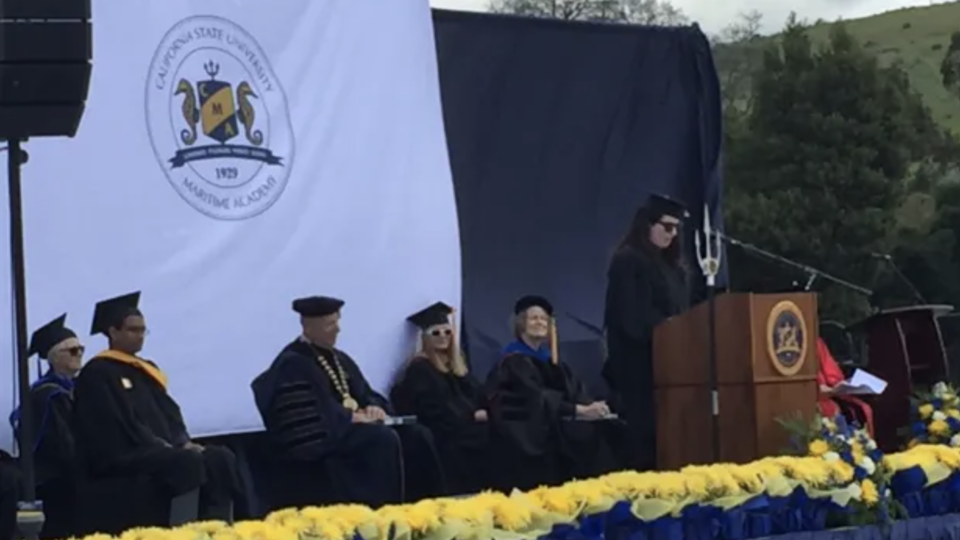
3 Houston universities score top spots for grad programs in Texas, new national report says
Rice University's Jones School of Business ranked No. 2 in Texas and No. 24 overall in the nation, while the Brown School of Engineering earned the No. 30 spot among engineering schools, and third best program in Texas. A

A Day in the Life of a Rice Master of Accounting Student
Grant Ketterer, MAcc Class of 2023, brings us along for a day in the life of a Rice MAcc student.

There is a lot to consider when choosing a graduate program, from the curriculum to the career outcomes to the student-life culture.
Rice’s tightknit Master of Accounting ("MAcc") community fosters the kinds of personal connections that can last a lifetime. We are proud of our unique student experience and wanted to give you an insider's view.
Read below as Grant Ketterer, a MAcc Class of 2023 student, offers a first-hand rundown of one of his Thursdays during his spring semester in the program.

6:30am: Day Starts
For classes on Tuesdays and Thursdays, I typically wake up around 6:30am. My morning routine is pretty standard: I take a quick shower, get my materials ready for class, and make a to-go coffee.
I have a dog, so I also take her out for a walk before I leave in the morning.
I live close to campus, so I usually leave my apartment 25 minutes before the start of my first class, which gives me plenty of room to arrive on time.
8:00am: Arrive on Campus
My Tuesdays and Thursdays this spring semester start with Data Analytics for Accountants II at 8:00am (one of my favorite courses), followed by Business Law at 9:45am, and ending with Data Analytics in Auditing at 12:30pm.
I find Data Analytics II especially interesting because we are able to use various software tools like SQL, Alteryx, and PowerBI, to solve a number of cases.
The professor, Yamil Kaba, is great at teaching us how to use the software and always gives us the freedom to incorporate our own approaches when solving the questions. This makes the course extremely dynamic, as you aren’t forced into a cookie-cutter process and can explore multiple ways to reach your conclusions.
11:15am: Lunch Break
I eat off campus for lunch, usually in Rice Village. I enjoy spending social time with friends from the program, and I always look forward to our lunches.
However, today was somewhat unique as our team (a group of four students assigned by the program during the first semester for group projects) was invited to the Rice’s faculty club, called the Cohen House, to have lunch with Senior Associate Dean Barbara Ostdiek.
Every team gets the opportunity to meet with her throughout the year, and we were able to discuss our backgrounds, future plans, and our experience thus far in the MAcc program.
Dean Ostdiek was interested in our recruiting experience and sincerely wanted to know how we felt about the program.
We were able to give her feedback on specific courses. For example, we expressed our interest in connecting some of the material we learned in Data Analytics for Accountants I (mostly Microsoft Excel) with practical applications from our finance courses.
It was clear that she valued our opinion and made notes to discuss with the MAcc faculty. I think this is one of the benefits of the small-sized MAcc cohort at Rice. Our individual needs are important to the faculty ,and we have an open dialogue with administrators.
Interested in Rice Business?
2:00pm: Classes Over
After our last class ends at 2:00pm, I go straight home and head to the dog park to play some fetch with my dog.
Most weekdays I give myself an hour or so to relax before I start working on schoolwork for the next day.
The workload can vary depending on the week, with some classes having frequent assignments and others having larger projects due every few weeks. The program is definitely condensed, but rarely do I feel overwhelmed by the amount of work we are given.
3:00pm: Thursday Pub & Partio
Thursdays are especially fun for those looking to spend some social time with classmates. The MAcc program provides us a weekly Thursday happy hour tab at the “Pub” on campus from 3:00-5:00pm, and there’s always a group of us there.
Additionally, on various Thursdays throughout the academic year, the Jones School of Business holds a “Partio” (a wordplay on "party on the patio") in the business school's courtyard for all graduate business students.
Student groups organize and cater different types of food. Each Partio has a theme with various games and activities.
This week was the "Dean’s Partio," with mini golf, soccer pool, axe throwing, and dart soccer. This is always a great time and gives us MAcc students the opportunity to mingle with the MBA students and decompress at the end of the week.

Above: Grant & other MAcc Class of 2023 students at the Dean's Partio
8:00pm : End of Day
The MAcc program does not have any classes on most Fridays. Since final exams are coming up, tomorrow I am going to be taking advantage of the open day to study to study on campus.
Rice's business school has its own library, called the Business Information Center, specifically for business school students. It's a nice place where you can go to focus on school projects.
Want to know about the MAcc student experience? Attend one of our admissions events! For more about the Rice MAcc program, visit our Admissions page or email us at RiceMAcc@rice.edu.
Keep Exploring
TMC launches co-hosted health tech accelerator with Denmark
Years ago, the Texas Medical Center established a biobridge to exchange technology and support with Denmark. Now, the two organizations are coming together to advance three health tech startups through a unique accelerator.
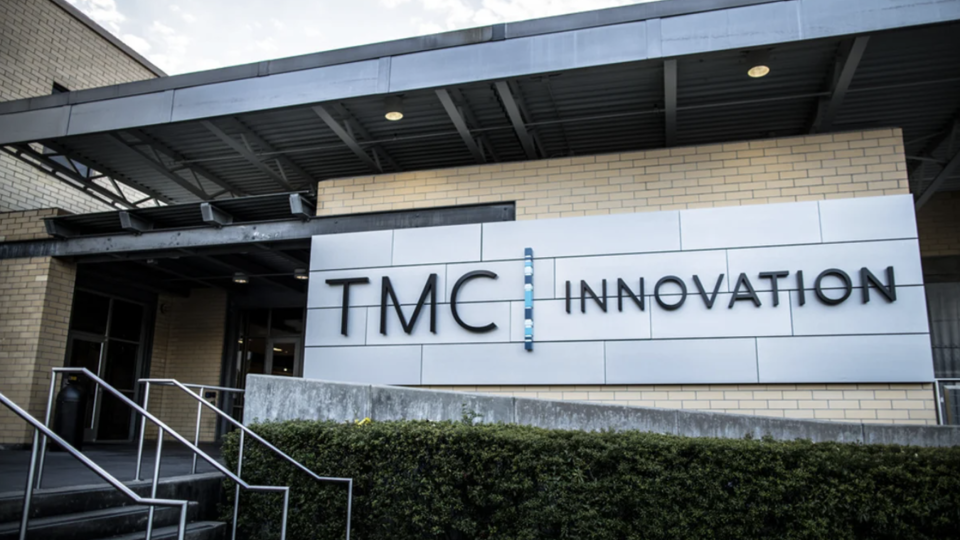
Is Your Company as Strategically Aligned as You Think It Is?
Building strategic alignment across an organization is always challenging, but a large gap between actual and perceived alignment makes it that much harder to get on the same page and implement a strategy effectively.

Ranking That Measures MBA ROI Gets An Update — And A New No. 1
A list based on MBA-salary-to-tuition ratio got an update following the release of the latest U.S. News & World Report ranking, and it placed Rice Business near the top with a ratio of 1.10.

Introducing Our Hybrid MBA
In July, Rice Business will welcome its first cohort of students to the newly launched Hybrid MBA program. Dean Peter Rodriguez discusses the decision to build the program — and why the market was ripe for it at Rice.


In July, Rice Business will welcome its first cohort of students to the newly launched Hybrid MBA program. Dean Peter Rodriguez discusses the decision to build the program — and why the market was ripe for it at Rice.
The Rice Business Hybrid MBA, the first of its kind at the university and in the state of Texas, is a 22-month, 54-credit program that begins with a weeklong in-person immersion. After that, classes meet once per month on campus, and in the weeks between, they meet online. Tuition includes residence at a hotel close to campus to help foster connections with peers and faculty while students work and study in McNair Hall.
Rodriguez recently spoke with us about the Hybrid MBA program, how it will expand our impact both nationally and regionally, and the value of networking across professions and MBA programs.
What made this the right time to launch the Hybrid MBA program?
It’s the right time because people have adapted to the great work-from-home experiment, which coincided with the great online education experiment during the Covid-19 pandemic. What we learned is how many students would benefit from and enjoy a hybrid program. We also knew we could deliver it very well and thought it would help us adapt to the market. People have much more flexibility in being able to work wherever they want. One hypothesis is that they would be even more interested in a face-to-face traditional education, but the truth is they want a little bit of flexibility everywhere, and that includes their education. What we learned from Covid and from extensive market research is that a once-per-month program — with online delivery in the weeks between — would be a great combination to add to our portfolio of programs and help us reach more students outside of the Houston region.
Interested in Rice Business?
When it came to designing this program, what lessons did you take from the great work-from-home and online education experiments?
One of the things we learned — and it’s not just from that experiment, but also from our fully online program that launched in 2018 — is that people highly value face-to-face, in-person meetings. But it’s difficult for a lot of our target population to be present in those meetings. Our new program has all the online components, which can be live or asynchronous, on Thursday evenings. It’s outside of working hours, and it’s only one evening, so people can pace their week and set aside time. One of the questions we had was, “who’s going to be most attracted to this program?” and our early hypothesis was that it would be students who live far away from the Rice campus. But we also found that work schedules are a challenge, even for people who live within a few miles of campus, so the idea was appealing to local students as well.
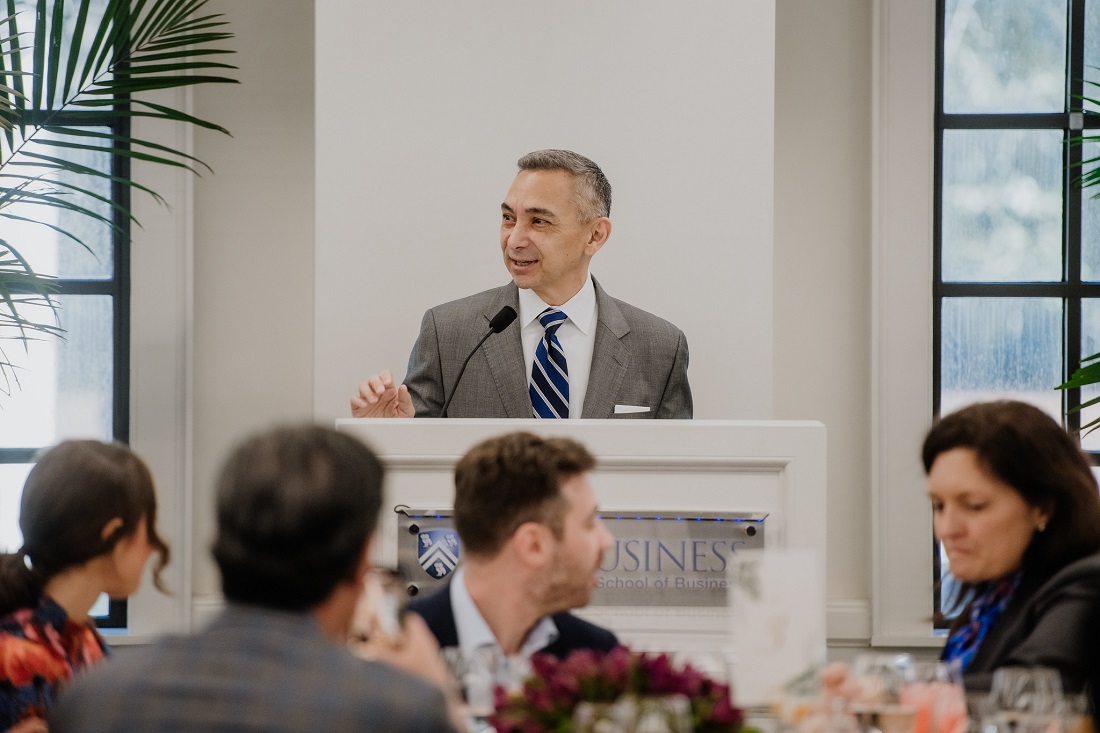
How does this program position Rice in the national business school landscape?
One of the things that makes you more visible in the national landscape is having student populations from lots of different geographies and many industries. Being able to reach more students who are part of the expansion of high-tech and software-related jobs in Austin, or part of the diverse manufacturing and service economy in Dallas, will help us. We’ve also had students from Mexico and from across the U.S. inquire. In the MBA@Rice program, we have students from Boston, Los Angeles, New York and other cities in the U.S. That has added to the quality of discussions we have and to the geographic expansion of the Rice Business network. I think that will help us to serve existing students in our other programs because there will be alumni and other students that they can connect with in these vibrant commercial centers, and not just in Houston. Working professionals bring contemporary problem sets from the organizations they work in, and we’ll be able to bring in students with those experiences from great organizations around the country and the big metro areas of Texas.
To read the interview in its entirety, click here.
Larry Clow is a writer and editor based in the Midwest. He tweets at @larryclow.
You May Also Like
Keep Exploring
The Tools For Strong Leadership Are Right In Front of You. feat. Ruth Oh Reitmeier and Brent Smith
Season 3, Episode 15
Listen as host Scott Gale sits down with Ruth and Brent to discuss their cutting-edge insights on the science of leader development, managing zillennials, and what we’ve learned post COVID-19.

Owl Have You Know
Season 3, Episode 15
Join Ruth Oh Reitmeier, director of coaching at Rice Business, and Brent Smith, the senior associate dean for executive education and associate professor of management and psychology at Rice Business, as they sit down with host Scott Gale to discuss their cutting-edge insights on the science of leader development, managing zillennials, and what we’ve learned post-pandemic.
Watch
Listen
Subscribe to Owl Have You Know on Apple Podcasts, Spotify, Youtube or wherever you find your favorite podcasts.
Episode Transcript
-
[00:00] Scott: Welcome to Owl Have You Know, a podcast from Rice Business. This episode is part of our Up Next series, where guests weigh in on the trends currently shaping the world of business. I'm your host, Scott Gale. And today, I'm speaking with two leadership experts, Ruth Reitmeier, director of coaching at Rice Business, and Brent Smith, the senior associate dean for executive education and associate professor of management and psychology.
Certain topics like cryptocurrency, AI, political polarization, and Jennifer Coolidge's comeback speak to the cultural zeitgeist. They characterize moments in time. But the topic of leadership and what it takes to be an impactful leader is endlessly relevant and fascinating. We all have the potential to be trailblazers in our lives and careers.
Even if you aren't a CEO or on your way to becoming one, everyone leads from where they are. Life demands it of us. Leadership isn't a title or position, it's an identity that's forged over time. So, I'm excited to have both Ruth and Brent here joining us for an in-depth discussion on what it takes to be a strong leader today, common pitfalls in leadership development, and how Rice Business creates transformational leaders.
So, let's just dive right in. Ruth and Brent, for those in the audience that haven't benefited from your expertise yet, can you tell us a little bit about yourselves, your roles at Rice Business, and how you became interested in leadership coaching? Ruth, can we start with you?
[01:32] Ruth: Yeah, absolutely. So, I'm Ruth Reitmeier, formerly Ruth Oh when I was an undergrad here at Rice. I graduated in the early '90s, met my husband here at Rice, raised my kids here in Houston. I've got three grown kids. And I got interested in leadership coaching because it seemed to be the right intersection for my skills and my interests and my experiences.
People who know me well will say that I'm kind of, that blend of, like, radical candor. Like, my husband will say, you don't pull punches. But people also will say, like, you care deeply about people. And because you care about them and love them, you know, you can deliver those hard truths. And those are qualities that you need to be an executive coach. You need to have backbone. You need to have heart. My role here at Rice Business is to build bespoke coaching programs for the students. We want you to graduate here feeling like you've been developed as leaders. And we want to bring some evidence-based practices to how we develop you as leaders. And coaching is one of those evidence-based practices. We know that it's effective. We know that it helps build your leader identity. And we know that that personalized approach can really help unlock your potential as leaders.
[02:48] Brent: Hi, I'm Brent Smith. I've been a professor at Rice since 2001. Most of the time, I stepped away for a little while. Prior to Rice, I was a professor at Cornell in upstate New York, and I've been at London Business School for a short period of time in the interim for a while as well. My PhD is in psychology, so I got interested in leadership and leadership developments, you know, all the way back to the early days of my PhD program when I was studying leadership and, kind of, thinking about some of the psychological mechanisms that affect people's ability to make transitions in leadership roles, particularly leadership roles of greater and greater levels of responsibility. So, that was, that was, kind of, my, I guess, the font of my initial interest, you know, in development.
When I got my first job at Cornell, I was completely unprepared for the task, but the dean of the Johnson School of Cornell asked myself and a good friend and colleague, Randall Peterson, if we would build a leadership development program for the MBAs. And we sat there and we thought about it, and we realized that we had no idea how to approach that or, you know, how to really think about the challenge of that. You know, we had read all the research around leadership, but we really hadn't thought through the process of taking people who were in an MBA program and getting them to think about an MBA program, not as a collection of classes, but as a full leader development experience.
And we built, you know, partially in concert with some other folks who were giving us good guidance, we built, kind of, the first coaching program for Cornell's, the Johnson School's MBA program. And it, kind of, started to take off a little bit. And, I think, slowly and very iteratively over the course of a few years, we started to build it into something that taught me about leadership developments, you know, as I was getting more and more interested in the science of it.
So, that was, that was really the font of my interest in leadership developments and, I guess, my practical experience. When I moved from Cornell to Rice, I think we put in the first proposal for a leadership coaching program for the Jones School around 2005 or 2006. We weren't quite ready, I think, as a school to be able to consume that kind of program. So, it took a little bit longer to get it in place. But I think around eight or nine or 10, we implemented a coaching program in the EMBA program that really looked very similar to what we had done at Cornell.
[04:53] Scott: So, one of the goals here, kind of, is to demystify leadership a little bit. And so, I want to just, sort of, cannonball in and, kind of, ask the question, like, as you've on-ramped to this journey and as you're, kind of, traveling down this highway, what have you changed your mind about leadership along the way? Some orthodoxy or some approach or process.
[05:12] Brent: I don't know if I would say that this is changing my mind. I would say that what has been reaffirmed consistently over time about leadership is that the belief that there might be some kind of magic bullet, you know, that really can solve the problem of leadership, it's, kind of, unrealistic. I think those who have been in my class, probably, have heard me, you know, belabor the point that leadership is something that is just unfortunately quite contextual. And without an understanding of context, it's really difficult to understand leadership. You know, if you're a frontline supervisor, you know, leadership means one thing. If you're a COO, leadership might mean something entirely different. If you're in a company with a highly innovative culture, leadership might be something. If you're in a company that's high-reliability, it might be something entirely different.
So, I guess, if I've become more clear about something, it's that leaders need to be very thoughtful about the context that they're in and let that be, kind of, the guide to what kind of leader they should be, rather than trying to look for a magic answer that might be out there in some...
[06:12] Ruth: So, can I share an unpopular opinion? I think that most leader development, as we know it, is very elitist, individualistic, and not effective. I think that, you know, it's a $366 billion industry worldwide, but why do we have such a leadership shortage? Like, why is everybody's leadership pipeline so anemic? And so, there's something that's broken in the world of leader development. And I think that being in a room full of people that are attached to Rice University, I think you know that there are bogus leader development things out there and then there's evidence-based leader development.
So, I think that what I would say I'm really passionate about and what I've come to, like, really want to push back against is, kind of, the myth of leader development and sending people away on corporate retreats and they're going to come back magically transformed. It's just a very slow, iterative process. And I just think people don't realize it's like going to the gym. You know, one of my mentors, David Day, says, leader development is a gym membership. It's getting up and going to the gym every day and working those muscles. And that's not very sexy or appealing to most people.
[07:23] Scott: I love this. I, kind of, want to hang out here for another second and just to triangulate a bit more and just, sort of, ask a bit more of a direct question, too, to just, kind of, layer on is just, kind of, what are some of the words you use to define, let's just say, good leadership? And you can reject, sort of, the question and reframe it as well, because context matters, all of these things. But, sort of, I think that there's, certainly, interest in those that are listening of, kind of, like, what are some of the characteristics that you have found in your experience that good leaders have?
[08:01] Brent: I think we spend a lot of time trying to figure out what the unified theory of leadership is. Okay. And all you have to do is to go into Google and search, you know, what are the traits of effective leaders? Or, what are the characteristics of successful leaders? And you will find 1,000 pages of information telling you that this is what it is, right? This is the Holy Grail. And the research that's been done on leadership, kind of, basically belies that simple finding. And what's fascinating, honestly, if you're an academic, is that academics can look at this problem and just monumentally disagree about it, because we can look at something that is a study that shows that a particular characteristic explains a certain percentage of variance and effectiveness in leadership and say, "Wow, look at that." But it's still explaining only that much variance in leadership. And the huge amounts are explained by other things, because people are in different contexts.
And I get, I mean, what I... what frustrates me, I think, about trying to identify universals or suggesting to people that there are, is that it can be extraordinarily misleading. Right? Particularly when the concepts that we talk about themselves are somewhat ambiguous and open to interpretation. I would love for people to think that the tools to leadership are right in front of them, right? But they have to understand what's right in front of them. You know, what's the culture in which I'm embedded? What are the expectations that my boss has of me? What are the capabilities that drive success for my team? What do my employees actually need from me as a leader? And start to build this, kind of, rich understanding of what's right in front of them that's giving them great information about the kind of leader they need to be at that moment.
The problem is, and I think this will probably get to my slight non-answer to your question. The problem is that context changes constantly, right? And I think any leader who's in a complex organization dealing with really challenging issues will tell you that, sometimes, that context differs 10 times in a single day, where I'm dealing with, you know, analyst community at 10:00 A.M. but at 2:00 I'm dealing with an unhappy customer, and at 4:00 I'm dealing with an employee who needs a little bit of coaching, or something along those lines. They're all different contexts that require different behavior for me to be able to succeed.
So, I was talking about this in a program that I was teaching yesterday and today. I had about 20 physician executives, you know, in a classroom. And someone very thoughtfully heard me talk about that and said, "So, what you're saying is that it's all about adaptability, then." I was like, "Yeah, maybe that's important, all right." A willingness to be somewhat adaptable, you know, and let the situation, kind of, be, to a certain extent, your guide.
[10:24] Scott: Ruth, any thoughts on that? I mean, we're wandering down a path that is somewhat deliberately to, sort of, start to chip away at effective leadership and what that means and looks like.
[10:34] Ruth: Sure. I mean, I would agree with the last thing that Brent said there about, like, the adaptability, the versatility. Like, when I'm coaching a leader, I'm trying to make sure that they have a variety of tools in their leadership toolkit, because different situations are going to call for different behaviors. And so, for somebody to say to me, "Well, that just doesn't vibe with my personality," I'll say, "Well, that's too bad. You know, your people and your environment are going to require you to behave in some different ways, and you will diminish your effectiveness as a leader if you can't learn some of these new skills." So, leadership coaching is about helping you add some skills, you know, to that toolkit, helping you read the room and know what people need. I think, you know, when you read the room today, in a lot of industries, people are looking for transformational leaders. And everyone uses that word pretty loosely, but, you know, in the literature, transformational leadership actually does involve four particular factors.
And I think that these are the four factors that, kind of, resonate with me when I think about the kind of leader that I want to be, the kind of leader that, I think, that zillennials want to follow. I've got 20-something kids. And so, I think about, what are they looking for in their leaders? And what kind of managers do I want to be shaping for the world that they're going to graduate and work in?
So, a coach-like approach to leading is really probably one of the things that I'm going to, like, be the biggest fan of, because I think a coach-like leader is really empowering other people in saying, you know, "You have the capacity. You've got the potential. Let me develop you. Let's unleash your potential for this organization." And so, as an organizational consultant, I can sometimes, you know, look at the big picture with my client, but then change has to happen at that individual level. And we know from the world of psychology that human behavior and change is really hard, but coaching is an effective tool to help bring about that change at that individual level. And you can't really mandate change from the top unless you've also got those frontline managers who know how to coach and bring people along with that vision.
[12:40] Scott: Just want to, if we can, kind of, draw this line out a little bit further, because I like to think that, sort of, no one sets out to be a bad leader, if we're going to, sort of, an ineffective leader, right? But as you're talking about, there's, sort of, an individual component to this and there's an organizational component to this. And so, would love to just, sort of, unpack that a little bit of, kind of, what are organizations doing well, could be doing better in the leadership development cycle for individuals? And then, kind of, follow up with, sort of, how individuals, whether within or outside of organizational context, can, sort of, enhance their leadership effectiveness.
[13:19] Brent: Can I take a step back —
[13:20] Scott: Please.
[13:21] Brent: ... and not answer the question? So, maybe related to all of this, right, we keep using the word, "leadership." And, you know, this is one of those great examples of having an idea that you talk about in class a lot, and then somebody else writes the paper that gets published, that's, like, "I've been talking about that forever, and I didn't write it, so I don't get any credit for it."
But, you know, when I... I've had this amazing luxury through the course of my career and working with a lot of companies through my job here and through consulting and things along those lines and having taught leadership for so long, you know, I get this great, rich experience having so many people who are in leadership roles in my classes, and talking to them about the challenges that they face. And to be honest with you, what I don't see in organization, you know, is an absence of leadership. What I see in organizations is an abdicationof the most basic elements of management.
And I think we oftentimes mislead people and organizations in making them think that everybody has to be, kind of, whatever this pinnacle thing is of leadership, which I don't actually think that's the big problem that most organizations have. I think the basic tools that are in a manager's toolkit are things that people don't do very often. They don't do them consistently. They don't make them a part of their day-to-day job and their day-to-day activities. And as a function of that, organizations suffer, people suffer, engagement suffers, turnover rates are higher, commitment’s lower, you know, all of those things.
So, there is a piece around training people to be better leaders that's just getting them to do the simplest things, but to do the simplest things pretty consistently. And to be honest with you, that's not that challenging. So, I, kind of, slightly disagree in the sense that I don't think that the biggest agenda, meaning where we have the biggest bang for our buck in terms of development, are the things that are terribly challenging. We just have to figure out a way to get people to do the simple things consistently, because that's going to have a massive impact.
And I agree absolutely with Ruth, that it's hard for me to define leadership or even to think about those basic activities without having managers have this view that coaching is, kind of, part and parcel with what their responsibilities are. Because, yeah, I agree with your point, not too many people wake up in the morning to figure out how they can go into the office and be a really bad leader that day. Like, I want to figure out how I can, in a new and ingenious way, promote greater levels of disengagement, you know, among my team. How can I just instill that last little bit of conflict that I haven't been able to, kind of, ring out everybody, right? They just go into the office and try to figure out how they can get the 18 million tasks that are on their plate done, but they forget about all the basic aspects of management.
[15:49] Scott: Can you double-click on just, like, one or two examples of those basics that, kind of, are out-of-line?
[15:54] Brent: Well, I mean, think about what we know about what employees tend to get really, really upset about, meaning the things that lead to disengagement and the things that lead to challenges with commitments and the like or the desire, maybe, to look for other organizations. Managers don't wake up in the morning and go in and say, "When was the last time I had a career-related conversation with Scott about what his desires and aspirations are and whether or not we as an organization are, kind of, helping him think that through and maybe taking the next step in that career?" People don't go into the office and think about opportunities to provide feedback to somebody because they haven't done it in about two or three weeks, or two or three months, or two or three years. People don't go into the office thinking about how they can take one of the experiences that's right in front of them and use it as an opportunity to give someone else an insight in how to do something a little bit better and display interest in their personal development.
You know, so much of development is just basic grunt work, right? You know, it's... particularly from a manager standpoint, it's saying, "I've got this limited set of tools in my toolkit, you know, feedback and opportunity and my experiences that I can allocate to people in ways in which... that can allow them to learn." But we race in and, you know, I know what your day's like. I know what my day's like. I know what probably your day is like. We race in and we just try to get all those things done and forget about the people that are there to help us.
So, if I could just, like, get people to do that, you know, very consistently and not in a way that takes an enormous amount of time, I think we would solve a huge part of the problem, you know, that people raise about leadership and management.
[17:20] Scott: That's helpful context. Ruth, I'd be interested in, sort of, like, as you're talking about thinking about leadership coaching, you observed, like, any, kind of, gaps in individual motivations? Or, kind of, what are some of the things that are keeping individuals from, kind of, crossing that threshold into understanding, kind of, leadership through that, kind of, coaching lens?
[17:40] Ruth: I want to answer that question by connecting it to something that Brent, you know, also said, which is, I think the way that we select and promote people into leadership is also broken. And so, we look for certain traits in people, signs that they're ready for that next challenge, that next level of leadership, but we tend to have a bias for certain personality traits. And those personality traits do not always translate into leader effectiveness or good management skills. So, just because somebody's outgoing and speaks up a lot in meetings and, you know, is extroverted and at the happy hours, that doesn't mean that they're necessarily going to be effective in a role where they have to manage their peers if you elevate them.
So, when I'm coaching people who have been promoted to their first management role, there's panic because they realize, like, "I was a really strong individual contributor, but I'm being thrown into the deep end without this training, without coaching." And so, like you said, people don't wake up thinking like, "How can I be a terrible manager or leader today?" I'd say maybe about one-third of first-time managers succeed because they've got the experience, they've got some, you know, skills to draw from. Two-thirds — 60-some percent — of first-time managers fail in their first role. And it's for lack of training, sometimes for lack of support along the way. And I think coaching frontline managers has got to be an investment for every organization. If you want to have a strong leadership pipeline, you've got to start addressing it with those early career people. You can't really wait until they're in their 40s and their first senior role to give them an executive coach. And so, there's a very strong tilt towards giving resources to people at the top of an organization when, really, your investment needs to be, kind of, at the base of the pyramid, of the organizational pyramid.
[19:36] Scott: Is there anything else that organizations are doing well in terms of that early identification of leadership and, sort of, getting ahead of that versus putting it off?
[19:46] Ruth: I think one of the things that I think a sign of a healthy organization and an organization that's going to have a strong pipeline is internal leader development programs. I think, when you depend too much on external consultancies, you get, kind of, this scattershot approach. If you can build something internal that's contextual, that's giving them the competencies that you know leaders in your organization need to advance and succeed, those are the organizations that are going to have sustainable plans for the future.
[20:14] Brent: You know, I would say, using the term, "organizations," I would say the organizations that seem to, in my view, get this right, are organizations that, kind of, build a culture that supports the notion of succession-planning from the top to the bottom of the organization. You know, where it's not something that is an activity that is restricted to the top couple of layers, where they're really thinking about how to allocate developmental assignments in a way that will round people out to take on the next big job. But it's something that's an ethic that's almost built into the way they think about talent all the way through the organization. And they try to really build into their leadership and their managers this idea that your job is to figure out how to cultivate the next generation of people that's going to take on your role.
And they incentivize their managers to be thinking about and to be developing that talent, so that, you know, when they step into their next role, that they have someone who can just easily backfill in. And that idea that, culturally, you know, a focus on succession from top to the bottom is something that, I think, creates the fertile ground. I completely agree with Ruth that organizations... I probably shouldn't say this out loud, given my role, actually, only part of my role. I taught a program today where people from multiple organizations could come to it. So, it wasn't, like, contextual, I guess, completely. But it is always better. But absolutely, I mean, leadership development has to be, kind of, framed within the context of the organization that you're developing those leaders in. It's not a generic process. And, I think, anytime you can be very bespoke, you know, in the process of identifying the challenges that the organization faces, that the leaders need to be able to address, and, kind of, the culture of the organization that you need to continuously promote through the development of leaders, you're always much better off.
[21:49] Scott: I want to, kind of, pivot a little bit and fold in this ingredient of zillennials into the conversation and, kind of, define what that means and, sort of, how this next wave of generational leaders is shifting and changing thought process and some of the new challenges that that might be introducing, opportunities that's presenting. Start to talk a bit about what you're both observing in that space.
[22:14] Ruth: Where should we start?
[22:15] Brent: Ruth and I are going to disagree about this.
[22:17] Ruth: Based on my experience with, you know, working with undergrads here at Rice and then having, let's see... I've got three kids — 19, 23, 25. They're smacking that zillennial demographic. And so, when I say zillennial, I'm talking about, like, 18- to 30-year-olds. So, the baby millennials, and then that first cohort of Gen Z that is now in the workplace, I think they are distinct. I think they are different. There's something about having grown up with technology. Their world is a lot bigger. They've been exposed to a lot more ideas. Their approach, their philosophy around building their careers is very different. You know, I'm Gen X. We graduated. We put on our suits. We went to work and did what our bosses told us to do. And we were good little soldiers for a long time because we wanted a promotion.
Zillennials aren't like that. If you work with the zillennials, you know that they've got a lot of attitude. They've got a lot of confidence in themselves. They're planning to job-hop after nine months. They're going to ask you for a raise and a promotion after they've been there for six months. There's a restlessness to them. There's a boldness there. And it's making management kind of tricky for a lot of people.
And so, what I'm seeing is, sort of, this, I would say that the boomers were the builders. Gen X, we were the maintainers. The millennials were, kind of, dissenters. They grumbled about corporate structures and traditions, but they, kind of, basically signed up and went along. Your Gen Z, they are the disruptors. They want to do everything differently. They will challenge your processes on day one. Maybe, they'll hang out for a week before they challenge your processes, but they will challenge your processes.
And so... they're really relationally motivated, though. And so, when people say, like, "I don't know how to manage them," like, you've got to treat them like people. They're not cogs in a machine. They want to be treated like people. And so, transactional leadership isn't going to motivate them, retain them. I think you're lucky right now if you can hold onto a Gen Z for 18 months. Two years, you're pretty lucky. But that makes succession-planning very complicated for a lot of organizations.
[24:28] Scott: So, Brent, there's a lot of heads nodding in the audience. You said upfront that you disagree. And so, would love to hear your perspective on the topic.
[24:36] Brent: I will take on every head nod. How much time can I have? Okay. So, let's start with research, and then we'll take it into, kind of, a broader context a little bit. My concern is a couple-fold. One is, I'm pretty old. I've had the opportunity to live through, kind of, successive generations that people talk about, you know, in the popular literature.
The problem is how we talk about generations tends to be very inconsistent with what the research shows us about generational differences, right? And it's not easy research to do, because you have this problem of conflating the stage of life a person is in, you know, which does actually quite naturally lead to, kind of, differences and expectations with actual generational differences that are based on, maybe, kind of, these collective experiences that groups have.
And it's not easy to tease those kinds of things apart. I've got a colleague who... a couple of colleagues, actually, who did some research where they were able to actually tease that stuff apart. And that research, consistent with a lot of other research on generational differences, basically shows that our assumptions about the existence of those differences, it's not consistent with what we actually find. In fact, we tend to find that the generations are substantially more similar in what they value out of work and what they want out of work, you know, than our perception of them would be. More importantly, and this is actually much more important for me, is that, when you look within a generational band, there is huge variation across that band and what they want and desire out of work. So, calling a generation a homogenous group where everyone believes the same thing, I think, is completely inconsistent with what the research shows, right?
Secondly, and this is where I think things from an organizational standpoint get important, when we stereotype a generation by saying that the generation wants this, the generation has this challenge, the generation has this demand, we actually, and we create or we reify this view. We actually create a situation where organizations start to treat that generation as if those things are true and real. And they get very much back the same kind of behavior that they expect, based on the treatment that they receive.
It's the same concept as a stereotype. When I treat someone in a stereotyped way, I tend to get behavior that's more consistent with the stereotype right back. And I think there's some reasonable evidence suggesting it's exactly what we're doing in many organizations. So many of the things that have affected younger generations affected older generations, too.
Now, there is something that I think Ruth highlighted that's important, but I don't think it's a generational issue. And that is we have kind of changed the game, right, you know, over time for employees that are slightly younger than me although it affects me too. And that is we shifted the relationship between employees and companies, and we did so in a massively dramatic fashion.
The knock-on effects of that has created a really, really dysfunctional environment for people that are at the early stages of their career. So, back in the day, people have talked about this before, but back in the day, when job security was the name of the game, that organizations conferred job security to the people, and it was built on an assumption that those people were going to give security back and give loyalty back to the organization, that was this foundation of what we used to call the psychological or what we call the psychological contract that explains that set of responsibilities between employees and companies. When we got rid of that, because organizations started focusing on efficiency and downsizing and everything, well, it got replaced, you know, with this idea that organizations do owe me something. It's not job security. What do they owe me? Well, they owe me a focus on me, my development, my career, my growth, in ways that's going to help me create a sense of career security, right? Because I'll work for you as an organization if you show me that you're going to help build a sense of security that I'm going to have the career that I want in the long term, because you're probably not guaranteeing me a job.
And one of the things we found is a fantastic researcher at Wharton who's done this study, is that turnover rates have consistently increased in organizations over the last 20 or 30 years to the point where recruiters believe it's much better to replace people who are leaving with external hires, which creates this, kind of, self-fulfilling prophecy of churn, right? How do I improve my career? I go to work for some other organization because that other, kind of, organization is going to see me as already being trained by this one. I jump ship. I'm going to get a, you know, increased pay rate. I'm going to get pay raise and, maybe, a promotion. But we promote that ethic, right?
So, early-stage career people are, kind of, walking into an environment where they recognize that, because of how we've changed the world, you know, that this is the best cycle to improve their career on.
[28:53] Scott: So, it's, kind of, like, the causality or, kind of, how we attribute, sort of, the features that we're talking about in, kind of, this 18- to 30-year-old band, is helpful to think about as we, kind of, diagnose and talk about, how does one lead or manage work with, what are of effective ways to, sort of, work with this band of employees as they start to, kind of, work their way through the workforce should be... Would love to, sort of, get some perspective, Ruth and Brent.
[29:22] Brent: The work from consulting firms that I actually am willing to accept, right, is every... almost every piece that gets published over the last 10, 15 years has really highlighted the idea that, if you want to enhance the commitment of employees, you need to demonstrate an interest in their career developments, their growth, their personal development, their learning.
And that, actually, kicked into really high gear during the, kind of, COVID period. In fact, you started to see in a study after study showing that during the great resignation that one of the big explanations wasn't just what we thought it was, but it was also the fact that organizations weren't paying attention to how this was going to affect their careers and having conversations with people over and over again.
So, I think the solution is, probably, the solution that we've always known, which is to dive right back into being really good and sophisticated into talking to people about, what do they want? You know, what do they want out of their employment with, you know, us as an organization? How do they see their careers progressing? And demonstrating what we can do with the resources that are available to us to help them grow the capabilities that will allow them to, hopefully, take those steps, when and if they become available in the organization. Just get back to that stuff.
[30:25] Ruth: I, kind of, lost the plot.
[30:27] Scott: Let me pull it back around because I'm... I want to ask, because it's this idea of, like, okay, we understand what's the attribution or the causality of, kind of, why employees today are behaving the way that they are. Because I think we all see, kind of, the information in front of us, I think it's clear that, maybe, attributing that to a generational birth year might not, sort of, make sense that there are other things, sort of, at play, which I like, and this idea that, like, the pandemic has, sort of, I was going to say unmasked. That was, maybe, a bad way to say it, but, sort of, like, revealed, kind of, maybe, a deeper-seated issue, maybe accelerated some things.
[31:03] Ruth: Sure.
[31:03] Scott: And what I want to do, as we, kind of, start to land the plane on the end of the discussion, is... and there's some hazard in doing this, but I want to, like, what are, like... I'm trying to get to, like, tactical, actionable kinds of things, some takeaways. And so, I want to, sort of, talk about this: how people are integrating leadership coaching into, kind of, their day-to-day. Like, what are some tips or advice or things to bring leadership coaching into, kind of, a tangible, "I show up at work tomorrow. I can, kind of, go do these kinds of things?" I know it's a terrible question, but I want to get it, like, tactical.
[31:37] Ruth: I like it. I mean, I think leadership coaching is built on, like, several things, right, like, empathy and human connection, authenticity, vulnerability, intellectual humility. Like, if you can embody a coach-like approach as a leader and bring those things to work, you're going to inspire people, you're going to connect with people. That is what zillennials are looking for. Like, "Show me that you are human, that I can go to work and be fully human also."
I think the pandemic did accelerate some of these changes. The zillennials were already, kind of, living under this cloud of existential angst, right? They've grown up with school shooter drills, active shooter drills, climate change disasters, terrorism, 9/11, you name it, pandemic. So, like, they live under this, like, very dark dystopian cloud. And to a lot of zillennials that I coach and talk to, they're like, "Do I have to really go to work and do this for the next 40 years? I mean, can I just run away and join a cult?" This existential angst. And so, the antidote to that is let them be fully human at work. You know, show some empathy as a leader. Acknowledge them. Acknowledge their challenges and their tribulations, even if they seem like petty dramas to you. People feel things more intensely when they're in their 20s. We do have research around that. So, I think, bringing your empathy to work, being fully human, connecting with them at that personal level, that is probably the number-one retention strategy that I'm telling my clients, is you've got to think about how you're showing up at work. Can you regulate yourself so that your employees can co-regulate in your presence? People are living under a lot of stress, there's a lot of burnout right now.
[33:23] Scott: So, treating your employees like humans, that's a good piece of advice.
[33:26] Ruth: Revolutionary, I know.
[33:27] Scott: I love it. Brent, any advice or things that you, kind of, go to? I know, I'm certain you get asked advice a lot on this topic. And so, what's, kind of, some of your favorite actionable things to, kind of, go and do start to chip away at this?
[33:39] Brent: Yeah, I think about it as a broader problem, but I agree with Ruth that, if there's been a positive outcome in the world of work for the pandemic, I think what it maybe has been is creating an environment where there's less stigma attached to workplace wellbeing issues, where there's a forum now where people can have a conversation that's meaningful about the amount of stress that they're experiencing, how job demands can be extraordinarily excessive, the compromises that job demands create, you know, and all of those kinds of things.
So, I do think there is this domain. And it's not just younger generations, it's older generations as well, that have the same well-being problem. That, as leaders, we can promote the conversation and deliver the support that is necessary to get people to maybe mitigate some of the negative effects of the excessive job demands that are created in an environment where people are operating in a really lean situation.
The coaching part of it, if I had my magic wand so that I could wave and get people, I didn't really mention this, like, for about 12 years, I taught a course that was really designed to train managers to be better coaches in executive education here. And, you know, kind of, my punchline to that whole thing was, at the end of the day, being a great coach is making sure that you're putting on those lenses every day when you walk in, and that you're looking for opportunities to help your employees enhance their capabilities in ways that are going to allow them to succeed in the job that they're in, and hopefully in the next job that you're already talking to them about, right?
And so long as you, kind of, wake up and realize that, "Yeah, I've got a lot of things that I have to do. My boss has high expectations for me," but you, kind of, have to make sure that you're wearing the coaching lenses first, you know, and then maybe all the task lenses second, that it'll prompt you to help ensure that you're building that relationship with your employees that will ensure their engagement, ensure their success, and help you get all that stuff done. So, I, kind of, like to think of coaching as just a perspective that then translates into a lot of activities that can really help engage and get a committed workforce that's going to help support you achieving them.
[35:33] Scott: I want to, kind of, pull on a thread, which, Ruth, you, kind of, touched on a little bit, which is, it seems like we're in, kind of, these early post-pandemic innings and talking about there's... I'm not a researcher. I read a book one time about, like, generational research, which was, like, these lines of demarcation for generations are often made by experiencing fear or, like, being in a place. So, like 9/11, as you mentioned, is an example. If you can remember, sort of, 9/11 is, like, one of the earliest Ideas or thoughts of feeling that fear. And what that can mean is there's, like, kind of, micro-generations, that there's, like, a political uprising in a particular geography or whatever.
And so, coming out of the pandemic with, sort of, the technological connectivity and the worldwide nature of it, is we've actually are just coming out of the most, sort of, comprehensive generational marker ever in human history. And so, we're kind of in this, like, the fuse is lit, there's this experiment that's, sort of, now gonna happen. And so, this is a crystal ball question of, like, looking ahead to the future, like, we're starting to see these, kind of, early indications that there's a discontinuity, some kind of inflection point in the space that we're talking about. Where do you speculate that that's going to take us?
[36:50] Ruth: I think where it's going to take us is I think people are going to have this new appreciation for this one precious life that they have, like, "Oh, my God, we survived. We made it. We're still alive, and we're still here today. So, how do I want to live my life?" And it doesn't matter if you are a 21-year-old, 51-year-old, you're looking at life and having this appreciation for it and also feeling a responsibility to live well.
I think that, if you are a leader, think about your responsibilities to the people that you lead, and how can you contribute to their flourishing, because they're coming to work every day and putting themselves under your leadership, which means you have a responsibility to help them flourish there. And so, that's something that I think about.
I also think about for people in the zillennial bracket. They're going to have this, like, thirst for life, I think. Like, they're gonna want to taste everything on the smorgasbord of life, because life is short. You don't know when the next pandemic might hit. You don't know when the next earthquake might hit. So, more risk-taking, more career-hopping, more appetite for adventure and trying new things. And so, I fully expect that the 20-somethings in my life are going to have probably five to seven careers in their lifetime. And I don't see any of them hanging around one organization for a gold watch.
[38:12] Brent: I'm really reluctant to prognosticate. Every time I've tried, I've failed. I've always been wrong. So, I will preface whatever I say by saying that I'm just probably likely wrong. I don't know. You know, as I've been asked this question over and over again at different phases of going through the pandemic, I think my attitude about it has changed. I do believe, and I'm willing to say I do believe fundamentally that the future, probably, will require from employers and, certainly, for managers, a greater tolerance for flexibility in how we do work and where we do work. I do think that's, probably, you know, a fundamental shift that's happened in organizations. And we're going to have to figure out how to adapt all of our, kind of, management-related tools to an environment where the proportion of people who are coming into an office versus working somewhere else is different than what that proportion looked like in the past.
And that actually propose, that just creates a lot of challenges that we are yet to have the greatest answers to, right? You know, how do you onboard someone who you don't see very frequently, right, or ever in the office? How do you manage culture and maintain culture and create consistencies in employee experience when people are bouncing back and forth here and there? How do you do performance management, you know, in a context where they don't actually ever get to see someone, or I see somebody very, like, episodically and, intermittently, so to speak? We don't have good answers to all that stuff, right?
So, because of, maybe, this demand for flexibility, that will lead to this, kind of, change in how we do a bit of work. We're going to have to go back and, maybe, do a whole lot of research and, kind of, rewrite some of the guidelines on how to approach those issues. So, I think that's, kind of, a big thing that's out there.
Beyond that, I've got to be honest with you, we are not that dynamic of a species, right? I mean, this is like a moment in time. There have been a lot of moments in time like this. And we tend to go right back, right to the old ways of doing things. So, I think the jury's still a little bit out on most of the big things. And my experience in the organizations that I'm working with right now is that there's a pretty strong demand to get things, kind of, normalized a little bit, with just a few changes in the basic assumptions.
We're a group-living animal. We have always been one. We always exist in status hierarchies, right? That's how we organize ourselves effectively. That's not going to change. So, we build organizations around the presumption that's consistent with how we organize ourselves.
So, how new and different will it be 10 years from now? I'm not really sure. I think a pretty strong argument can be made that it might go right back to the way it was.
[40:35] Scott: Awesome. Ruth, Brent, thank you so much for being on the show today. This has been awesome. And thank you for bringing your talents and passions to Rice Business and the leadership development opportunities here for students. This has been fantastic.
And we are going to open it up. We've got 15 minutes of audience Q&A. We're going to bring a microphone up here and would encourage you to come and ask your questions into the mic, so we can capture it for posterity.
[41:11] Audience 1: Hi. So, thank you, both, for speaking. Right from the very start when you both started talking about topics like leadership as an identity and contingent and based on your actions, combined with your shared emphasis on the need to develop leadership lower down in the organization with the younger, more junior employees, it put me to thinking immediately about the concept of influence — so, you know, leadership without that legitimacy authority. And I wanted to get your thoughts on, number one, if leadership isn't so tied to your hierarchical position, then, first of all, what is the actual difference between leadership and influence, if any? And two, if we agree with everything that we've said, and I think we do, what would you say are the most important takeaways that we can have as leaders for recognizing and developing influence in those more junior employees to help bring them up into the company's succession? I know that was a very long question [crosstalk 42:36].
[42:24] Brent: Requires a very, very long answer. Ruth, you got a 30-second version?
[42:29] Ruth: I would say yes to all of the above. Yeah, you can walk into any middle-school cafeteria and figure out who has influence, right? And it's not necessarily the student council president that has a title or captain of a football team. You can see in any group of human beings who has the influence and who's going to be the de facto leader when the need arises. So, I think, being able to help people see... develop that leader identity, apart from a role or a title or a position, is really important. I think, you know, helping people find their voice, understand their values, living those out, that's really, I think, the heart of leadership. And there's something authentic and attractive about that, that people are drawn to. And when you turn around and people are following you, that's when you know you're a leader.
[43:19] Brent: Maybe, one way of thinking about it is that you can think about, you know, influence as an act and you can think about influence as an attribute. I, based on a variety of things, maybe a lot of it being built around my social capital that I've developed over time in the organization, you know, I have a lot of, kind of, natural influences built around that. And, you know, generating that kind of influence through social capital is really a function of recognizing the relational component, right? To what influence is building the relationships, establishing the relationships, creating relationships in a way that allows me to broker resources and, kind of, maybe broker other people's capital when I need it. And that's a very strong component of it.
Influence is an act. We've spent years and years and years and years studying that phenomenon. And helping people understand that to influence others is not a common set of strategy. It's not one thing, it's the recognition that not everyone is going to be influenced by the same strategy. And making sure you have an understanding of what all the strategies are, so that you can employ them when they're needed. And, yeah, I think you have to think about it differently in which side you're on.
[44:16] Audience 2:Hi. Let's get a little tactical for a moment. You both alluded to, and I'm thinking specifically, middle managers and line managers being thinly staffed. And, of course, we all know that, over the past, I don't know, 20, 30, 50 years, organizations have gotten leaner and managers are rewarded on their task output, not their leadership output. And it's time-consuming. The amount of time it takes to have authentic and meaningful conversations about, not only the employee's task, but their growth, etc., can take a considerable amount of a manager's time. And they're not necessarily rewarded for those activities. At a basic level, when you go into an organization to suggest additional leadership coaching, how do you quantify the value of [crosstalk 45:19]?
[45:07] Brent: Oh, this was... I thought you were going in an entirely different direction with that question. That was like a curve ball at the very end. Like, honestly, I have to ask... answer the first part. I actually think it's a bit of a myth that coaching takes a lot of time, right? Don't give me that reaction.
[45:21] Audience 2: I am a line manager in an active organization.
[45:24] Brent: So, I will tell you very quickly a conversation that happened in class today. And I have to give credit where credit is due. The person who, kind of, taught me a lot about all of this is a guy named David Peterson, who was a person who got really well-known in coaching early on. He got his PhD just a few years before me, but in counseling psychology, and mine's in organization psychology. And 25 years ago, I flew him into Cornell to teach a class on coaching to my MBA students because he was already really well-known as a coach, and I was just trying to figure out what this whole thing was all about.
And one of the students in the class, kind of, at the very end, raised his hand and said, "David, this has been really interesting. But maybe you don't understand what my job is like, because my job takes about 99% of my time, and now you're telling me I have to coach my employees. You know, but, like, seriously, come on." And David gave the best answer to that question I've ever heard, and it stuck with me for a quarter century. And it's, kind of, how I built my leaders coach class, you know, so many years ago.
What David said was, "You might, kind of, miss the point a little bit, because coaching isn't the hour meeting that you schedule with an employee once a week to deliver a little bit of coaching. Coaching is how you utilize the natural flow of your work-related experiences to give other people insights and opportunities to learn and opportunities to develop and opportunities to grow. Because right in front of you every single day as a line manager, you are doing tons of things, all of those tasks. What you have to figure out is, which one of those tasks are really developmental opportunities for other people, and how you can involve them in that in ways that show them how to do something that you're going to want them to do in the future that can, maybe, even give them an opportunity to actually do it, you know, with your supervision. And that can just expose them and demystify something for them that they might not have had any real insight into it."
And when you're using the natural flow of your own experiences, it doesn't take a lot of time. You're going to do the work, anyway. Just bring them into the whole conversation. Show them what it looks like. Give them that toolkit. The upfront cost is asking questions of people about what their career-related expectations are. But you can't manage people without having answers to those questions, right? That's just, kind of, a baseline.
So, once you get past that, I really don't think, you know, if you're doing coaching the right way, providing the feedback at the right time, sharing experiences and utilizing experiences, it has to be that big of a drain. You're just doing it in the context or course of your normal day.
[47:29] Audience 3: In the U.S., in general, coaching is regarded as a good way of, you know, or a way to elevate your performance. But in some cultures, it's still seen as remedial. So, in a global organization, how do you help these other cultures understand, when you're giving them this opportunity of an executive coach, it's to up-level their skills and not remedial?
[47:53] Ruth: That's a great question. I'd say that, you know, 20, 30 years ago, here in the U.S., it was considered remedial, also. What, kind of, turned the tide was just the flood of coaching at the senior leader level, right, where it became seen as a privilege and a perk, and this is an investment from the company because we value you so much and we want to retain you. So, you have to start providing coaching to those high performers, to those valued employees, so that it takes away the stigma of this being something for the problem people.
[48:24] Brent: Yeah, I would, you know, the more senior leaders can celebrate the fact that they themselves, you know, are benefiting from coaching, the more it actually creates a culture where it's much more, kind of, amenable to everybody getting on board. But I think just, kind of, communicating the message, right? So, there are so many different contexts in which coaching is really, really, really valuable. One is actually elevating performance. That is a fantastic context in which coaching can be valuable. But there are others that are equally valuable, like helping people adapt to change, right? Whenever your organization implements, you know, significant change, enterprise-wide change, there are going to be a lot of people who are uncomfortable, who are concerned about their competence and capability, who might just, because of their personalities, be a little bit resistant to doing new and different... And it's a great context where coaching can actually get people over that particular hump.
One that's also really important is taking people who are, kind of, fantastically capable, really great contributors, high potentials, and rapidly accelerating their development so that they can take on that much bigger role. And when you can celebrate examples of all of those, it destigmatizes, you know, the fact that they're... that it's always about underperformance and that you've been identified or you've been tapped only because you're not hitting your standards.
[49:35] Audience 4: Thanks for all three of you guys being here tonight. It was really enjoyable. Brent, you talked about succession planning from the C-suite individual contributors. And then, you said, "And you have to incentivize it." How do you incentivize it?
[49:47] Brent: So, the very best organizations, I think, are organizations that build directly into the performance management process some kind of evaluation of the extent to which managers are meeting human capital goals, right? And a part of that is asking employees of that manager, is your boss having conversations with you about whether your... what your career's going to go? Is your boss actually demonstrating an interest in your development? Are they allocating resources in ways that will actually give you that chance to develop?
We know those things are directly related to engagement. We get that data off of employee engagement surveys all the time. Build it into the performance management process, so people are being held accountable, not just for results and outcomes, they're being held accountable for the things that are going to contribute to the achievement of those results and outcomes, which are all these human capital metrics that aren't that hard to measure, right?
There are organizations, by the way, that do this. They do it in a pretty sophisticated way. And they actually build a component of a manager's incentive compensation around those very factors. And those are the organizations that are really trying to take it to a cultural level. You know, this is what we expect out of managers. We expect this to be the experience that employees have.
[50:48] Audience 5: So grateful for all the insights and what you've had to share, but Owl Have You Know, that we might have to consider the redefinition of the organization, because in the '60s here in Houston, we were working on getting a man on the moon. And now that we're in the 21st century, we're talking about a dystopian cloud. We're talking about a pandemic. We're talking about a food, water, energy, and health crisis. So, to me, from a leadership perspective, you keep talking about an organization as if that organization is the organization from the industrial age to present day. And then, you were talking about, where could we see ourselves in 10 or 20 years?
So, from a leadership perspective, shouldn't the organizations be thinking outside of their four walls? And we've already created this hybrid workforce, because we have to solve some of these seemingly impossible challenges, because now Houston wants to be the leader for the energy transition. And they're also building out this massive incubation, and they're trying to catalyze capital. Shouldn't we be thinking of leadership on how we're preparing an individual that could be job-hopping, from a career perspective, to already span organizations and being prepared as the organization we think traditional to the organization we're growing into, that I got to hand these employees off, and that, as an organization, I need to think of this as an ecosystem, and how do I then educate and coach for people to be in this ecosystem so we can solve these challenges that we are facing?
[52:30] Brent: No, we shouldn't do that. It's way too hard. I mean, leading question. There's so many things that I think we could add to that, right, you know, in ways that would shape the possibilities for what leadership could look like in the future. I've got a former colleague who, he and I are in faculty together at Cornell, and then went to USC. And he's just recently retired. He's done, like, some really interesting work on how the very unit around which we create organizations, a “job,” has changed pretty fundamentally and has made arguments about the future of what "jobs" are, with substantially less defined and more ambiguous, kind of, responsibilities and what the implications are for organizing, for performance management, for leadership, for all of these things.
And although it's a more micro-level view of what you're talking about, you know, it has a similar kind of effect. It means leaders have to be even better at continuously establishing expectations in ambiguous situations for what they need out of people in that particular moment. And figuring out how, over time, whatever that time period is, they can aggregate that set of expectations that they've created for people into something that's, kind of, meaningful, that can lead to how we define success, that can lead to how we choose to promote or not promote, to how we compensate or not compensate, right? I mean, I have no answers to those questions. But I think there's, like, just this very fertile bed for interesting research that can help us think it, think it through.
[53:58] Ruth: I love how you took us in this very, like, inspirational big direction because that should be what leadership does — it should inspire us to tackle the biggest problems out there. Every problem on this globe, you know, could be solved if we had the right kind of leadership and alignment and resources.
I want to point out over here, there's a little cluster of students that graduated from the MBA program a few years ago. They were coached. They learned a lot about leadership coaching. They saw a problem here in Houston with refugees coming in and not being prepared for the school system. They started a nonprofit. And, I mean, two years in, they're recruiting coaches, they're changing the lives of immigrants, just right here in Southwest Houston. And so, like, I love how you're telling us like leadership isn't about... it's not trapped in an organization. It's not limited to succession and titles. It's being able to take those abilities and have that vision and tackle those big problems.
[54:59] Scott: Love it. Great conversation. Thank you so much, everyone, for bringing your questions. And then, just a quick comment of gratitude to Kateri and Ananya here who helped coordinate and organize the event.
And again, a big thank you, Ruth and Brent, for being here. This has been a privilege. Thank you so much.
Thanks for listening. This has been Owl Have You Know, a production of Rice Business. You can find more information about our guests, hosts, and announcements on our website, business.rice.edu. Please subscribe and leave a rating wherever you find your favorite podcast. We'd love to hear what you think. The hosts of Owl Have You Know are myself, Scott Gale, and Maya Pomroy.





